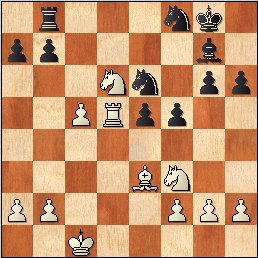Got myself yet another book on the Dutch Defence a few days ago, the recently published:
Play the Dutch - Neil McDonald and alas I was immediately disappointed. :( Follow the link to a chesspub thread on the book, where I tell you why.
Here's another link, for those who like chess problems, especially if they look like they might actually happen in a game. Chess problems by Vitold Yakimchik
Last weekend, my club team made its début in the 2nd highest series. We both lost and won with 4½-3½, and somewhat fortuitously I managed to win both my games. :)
In the first, I've just played Rh1-e1 - since my hand insisted on it - then black (a 1960 rated junior) fell for the temptation of snatching the h2-pawn. Luckily, there's a good reply...
That later led to the following, where I've just played the nice move Nc3-d5!, and then my king went pawn shopping and queen dodging.
which later led to this position
and my king eventually reached d7, and when Qd3+ came, he had to exchange queens after Qd5, as after Qh3+ Kd8, Qg8# is an unstoppable threat. For some reason he kept playing on even after the queen exchange but I'll spare you the final diagram...
The next day I was black against a 2300 player and I chose to revisit an opening I hadn't played since 1999. It turned out that I had forgotten most of the theory I once knew, but white didn't seem to know it either, as he let me off the hook but kept playing like he had the advantage.
In the following diagram, he has just surprised me with Rd1-d5, a move I hadn't even considered. And maybe my form is good at the moment, since it's a big mistake!
Often, I find that the difference between playing well and badly is found in the moves you subconsciously remove from your attention when calculating. When your opponent's surprise move is bad, you're good and when it's good, you're bad...




No comments:
Post a Comment